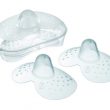If your little one is diagnosed with reflux you might be searching for a simple solution to help him settle after feeds and sleep longer at night. As a result, you might get caught up in Google search results, spending hours reading forums. But you will most probably end up being more confused than ever.
First of all, it’s alright. Reflux is quite common.
Most of the time, reflux in babies is due to the child’s immature digestive system and most infants grow out of the condition by their first birthday.
In fact, according to studies, it’s estimated that more than half of all infants experience acid reflux to some degree. Being in good company is not what you’re looking for. I know. But there’s unfortunately no quick fix or a magical formula (pun intended).
Here’s few things to keep in mind during this phase:
- Make sure you’re not missing first signs of hunger. Smaller portions and frequent feeding will reduce discomfort.
- Laid back nursing is your friend. It’s the best position to prevent acids from creeping up and allowing him to sleep easier.
- Keep an eye on your diet and consider an elimination diet for dairy, gluten or eggs.
Here’s a couple of things that could help you manage your reflux baby without losing your sanity:
1. Invest in a baby carrier you feel comfortable
Wearing your little one with a ring sling or a simple wrap will help him settle down after each feed. This way you can keep him upright and have two hands free!
2. Keep him upright as much as possible
When you’re not wearing or snuggling your baby try to keep him upright and comfortable on bouncy chairs or simply by supporting him pillows.
Finally, one thing you will not need, contrary to all the advice!
Any formula that claim to be a specialty formulas for reflux baby.
Why? Research has shown that formula fed infants have episodes of reflux more often than breastfed babies and they last longer.
Moreover, according to studies gastroesophageal reflux (GER) is less severe in breastfed infants than in infants fed artificial baby milks.









